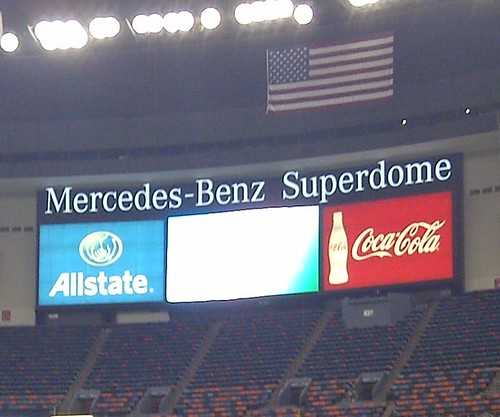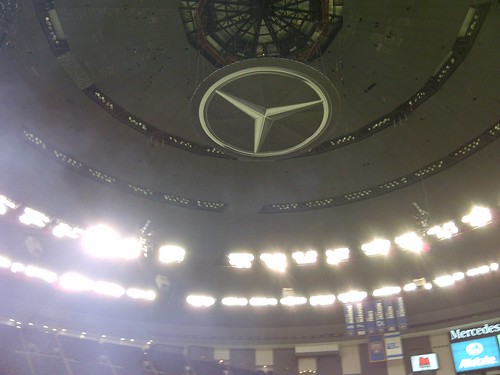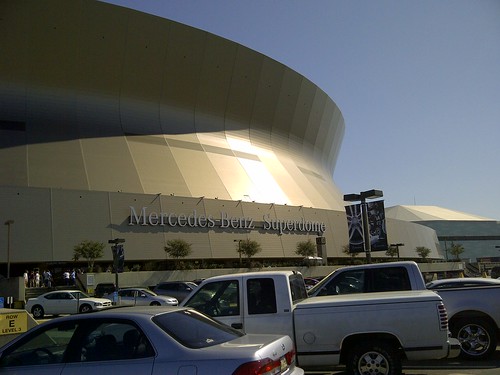West Bay Diversion Project to End. Or at least, that was the headline in early 2010.
Backing up, West Bay was the first diversion project optimized for sediment diversion. It's also WAY larger than either Canarvon or Davis Pond (ea. ab. 10,000 CFS vs. 50k+ for W. Bay). Canarvon and Davis Pond are sometimes called failures, but that isn't really fair, since they were optimized to fight saltwater intrusion only and NOT to carry sediment.
West Bay is located near Head of Passes (scroll down on the link for the maps). Planning started in 1991 and it was the first diversion optimized for sediment diversion. It was opened and petered along for a while, but was considered a disappointment. The Corps, who hated the project from the start (they believed it would be a hazard to navigation or would just plug up), trumpeted the failure and pushed for its closure.
Here's a quote from Dr. Len Bahr about the Corps and West Bay:
Despite its recent construction in 2003, bathymetric surveys in 2009 showed that sediment accretion from the West Bay Sediment Diversion project had exceeded subsidence in parts of the project receiving area for the first time in almost a century. Nevertheless, the public was told that a lack of significant wetland accretion contributed to a decision to shut down this ‘youthful’ sediment diversion project.
They also forced CWPPRA to pay for the dredging of the Pilot Town anchorage, despite modeling that proved West Bay was responsible for 20% (or less) of the shoaling and that the anchorage was built in an area that was prone to shoaling anyway. Here's a presentation from a past Tulane Engineering Forum describing the sediment transport modeling [PDF]. Furthermore, the port people weren't really complaining because the anchorage is hardly ever used (pilots are almost 100% available within a few hours notice at Head of Passes; the anchorage is almost a vestige of the old sailing days).
Enter the 2008 and 2011 Mississippi River floods (both of which were BIG, especially 2011 which was at least a 100-year event). West Bay, which wasn't a total failure like the Corps was making out, but also wasn't lighting the world on fire, explodes in activity and they figure out the missing ingredient: sand and gravel. The normal river flow has almost no sands in it; it's all mud and fine sediment (good for nourishing plants, but not enough of a base for land-creation). In flood events, there's a totally different dynamic. During flood events, sediment load per unit volume of water is at least 50 times larger, with much coarser sediment mobilized. The Corps continues to call West Bay a failure.
There was also an interesting side story that happened about this time: CWPPRA was investigating barging sediment from one area to another and asked the Corps about shortcutting through the West Bay diversion instead of going all the way around to SW pass. The Corps said, 'bah, it'll be too shallow and you'll just get stuck on a sandbar and we know everything there is to know about river dynamics because we've been studying it for 100+ years.' Well, the barging project was shelved because of cost, but they did to a hydrographic survey and the depth of the West Bay channel: 84' (barges draw ~20' or less).
More and more, the science community wants to study West Bay (being wrong in science is a good thing; you learn something new). The Corps is doing what a bureaucratic organization does to something it sees as embarrassing them: kill it with fire. The Corps had finally blackmailed CWPPRA into closing West Bay in 2010 when 2 monkey wrenches were thrown into the mix: the 2011 floods and the shipping people 'stabbed the Corps in the back' (or so that's how the Corps felt, so I'm told). Note that that link is dated October 13th.
My theory behind the objection: the port people know SW Pass is hydraulically inefficient and a pain to keep dredged. They're looking into a new, deeper pass much closer to Venice and see West Bay as an interim solution to accommodate New Panamax-class ships (Panamax=39.5' draft, New=49.9' draft) in a cost effective manner (as opposed to Miami's expensive Deep Dredge Project that's caught up in Tea Party-type stalls). The Port of New Orleans has been doing extremely well with containerized cargo this year (highest ever for NOLA?) and want to get an even bigger slice of that pie going forward.
How will this all shake out? Will the Corps force the closure of West Bay? Will we ever learn how to save the coast? We shall see.
Wednesday, October 26, 2011
Tuesday, October 25, 2011
So much catchier than "Drill, Baby, Drill"
H/T Fuel Fix. Actually pretty cool. They even get what a Christmas Tree is.
Remember kiddies, don't drink and drill, no matter what the Russian guy says.
Saturday, October 22, 2011
Sneak Peek of the BenzDome
Took a break from grad school to go to the Tulane/Memphis game. It was Tulane's homecoming game. It was an interesting game to watch, but unfortunately Tulane lost. Oh well. It's not like it isn't the first time I've seen Tulane football lose.
There were 25,000+ people in attendance, but, because it's the Dome, it still looked empty. A bright spot: got an early preview of tomorrow's Premiere of the new "Mercedes-Benz Superdome":



There were 25,000+ people in attendance, but, because it's the Dome, it still looked empty. A bright spot: got an early preview of tomorrow's Premiere of the new "Mercedes-Benz Superdome":


